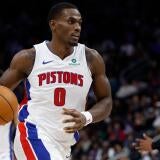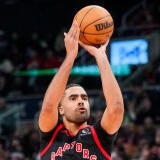USA men's basketball reckoning with new Olympic reality, stunning loss to France yet another 'wake-up call'
It might be time to come to terms with the fact that the Americans are just getting beat

After Team USA lost its Olympic opener to France, 83-76, on Sunday, ESPN analyst Tim Legler posited that perhaps this result could be a "good thing" for the Americans -- that it could serve as a "wake-up call" as they move forward in their quest for a fourth straight gold medal. Funny thing about that: Gregg Popovich and Jayson Tatum said the same thing after the U.S. lost to Nigeria two weeks ago in Las Vegas.
"In a way, I'm kind of glad it happened," Popovich said. "That means nothing if we don't learn from it. It could be the most important thing in this tournament for us."
"I think this is good for us," Tatum added. "We are going to learn a lot from film, regroup and stay positive."
Turns out, it wasn't that good for the Americans. Two days later they lost to Australia, doubling their number of exhibition losses over the past 29 years in a 48-hour span. If Team USA hasn't been "woken up" yet, perhaps we need to consider the possibility it was never really sleeping in the first place. It's just getting beat. Plain and simple.
It's difficult to fully believe the Americans, who are the most talented team in the international world by a mile, are truly putting their best foot forward and still losing. Yet in basketball, one matchup can neutralize, and in some cases trump, what would look to be a lopsided matchup on paper.
Against France, that matchup was on the interior. The Americans played and will continue to play small, with Draymond Green and Bam Adebayo starting in the front court and subbing for each other throughout the game. The French countered for long stretches with varying twin-tower lineups anchored by three 7-footers in Gobert, Vincent Poirier and Moustapha Fall.
It was throwback bully ball: offensive boards and deep post positioning with a few beautiful high-low feeds mixed in as the U.S. got caught switching its woefully undersized guards down low. Gobert and Fall combined for 21 points on 6-of-8 shooting -- dunks and free throws in classic big-man deployment.
The Americans, in theory, want to counter opponents' size with fast-break offense and shooting, but they couldn't consistently get into transition because the French were beating them to crucial boards and scoring in their own right. You can't run if you're taking the ball out of bounds, and Evan Fournier and Nando de Colo (to whom the Toronto Raptors have tendering a qualifying offer each of the last six years in case he decides to make the NBA jump) made certain the Americans had to do plenty of that with 41 combined points.
As for the shooting, the U.S. shot 36 percent from the field and 31 percent from 3. If you aren't getting out on the break and you're not making your jumpers (a necessity when France's size was closing off the paint), then playing small goes from an advantage to a disadvantage very quickly.
"Every team has to do what fits with their personnel," Popovich said of Team USA's smaller lineups. "And with our team having our two big guys, Draymond [Green] and Bam Adebayo, out there gives us a lot of pace, makes us move well, and works best for the combination of people we have."
The Americans, who led by as many as 10 points and enjoyed an eight-point lead with four minutes to play, didn't make a single basket over the last four and a half minutes as the French closed the game with a 16-2 run. With under a minute to play, the U.S. missed an incredible five shots on one possession, the final three of which were wide-open 3-pointers from Zach LaVine, Kevin Durant and Jrue Holiday.
USA's Draymond Green after Tokyo Olympic opening loss to France: "We haven't been together that long, but we've been together long enough to have that consistency. We have to defend better down the stretch."
— Ben Golliver (@BenGolliver) July 25, 2021
Good on Green for not blaming the loss on a lack of time playing together. It's a factor, but it's also an excuse. The Americans have more than enough talent to compensate for any lack of chemistry. They're never going to be the most cohesive team, but they still went undefeated en route to winning the last three gold medals (2008, 2012 and 2016). They just have to play better. Shoot better, particularly.
That's what this team is supposed to do. We're talking about a squad with Kevin Durant, Damian Lillard, Zach LaVine, Devin Booker, Khris Middleton, Jayson Tatum and Jrue Holiday, and yet only Holiday -- 18 points on 3-of-6 3-point shooting with his usual blanket defense -- played well on Sunday. The other six combined to shoot 7 for 26 from 3.
Durant sat for a long third-quarter stretch with four fouls (accumulated by trying to defend well above his weight class on switches) and missed all five of his fourth-quarter shots. Lillard shot 3 for 10 and had more turnovers than assists. While Fournier's role as the go-to scorer for France is clear, the Americans are clearly struggling to establish a scoring hierarchy among a roster full of guys used to be the No. 1 option. On Sunday, it led to overpassing and hesitancy to attack one-on-one matchups that would be attacked as a matter of course in an NBA game.
But these aren't NBA games. The American scorers are not getting the touch fouls they enjoy in the NBA. They don't get to stem runs or cold shooting stretches by getting to the free-throw line with ease. You earn your points in FIBA ball. France's defense was aggressive on the ball with size in the lane. It was tough sledding, and the Americans simply couldn't get enough buckets.
"We were just trying too hard to do the right thing," Lillard said. "Instead of just being who we are -- the best players in the NBA."
It's true. These are some of the best players in the NBA. But after these last two weeks, if the Americans still haven't realized that talent advantage can be neutralized by more cohesive teams with enough top-end talent to maximize matchups, what's one more wake-up call going to do?


















